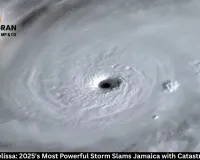Sudan Conflict Reaches Critical Juncture as Paramilitary Forces Tighten Grip
Digital Desk
.jpg)
The fall of el-Fasher to the Rapid Support Forces marks a devastating turn in Sudan's two-year civil war, triggering mass killings and exacerbating the world's largest humanitarian crisis.
A City Besieged, A Nation in Peril
EL-FASHER, Sudan – Sudan's civil war has reached a pivotal and bloody milestone as the paramilitary Rapid Support Forces (RSF) consolidated control over the entire Darfur region with the capture of el-Fasher, the last state capital in the region previously held by the Sudanese army. The October offensive culminated in a campaign of mass killings that left hundreds dead and forced tens of thousands to flee into the desert, according to humanitarian monitors.
The local Sudan Doctors Network reported that at least 1,500 people were murdered in a 48-hour period during the RSF's invasion that concluded on October 26. Those who remain in the city are hiding from RSF troops in underground trenches, while those who fled risk dying of thirst and hunger on treacherous desert treks to reach safety.
"The large-scale attacks… made starkly clear the cost of inaction by the international community," said UN rights chief Volker Türk, echoing aid workers' frustrations over the global response to a conflict that has displaced millions and pushed the nation to the brink of famine.
Anatomy of a Humanitarian Catastrophe
The siege of el-Fasher exemplifies the war's brutal impact on civilians. For over 18 months before its fall, the city endured a suffocating RSF blockade that forced residents to survive on animal fodder. Now, the humanitarian collapse is complete.
Women and girls are being raped and people are being mutilated, described Tom Fletcher, the UN's top aid official, of the terrifying plight of those fleeing the city. The International Organisation for Migration confirms just 33,000 people have reached nearby towns, where they lack adequate shelter or food aid, relying instead on local volunteers for sustenance.
This local tragedy unfolds against a national catastrophe. Nearly 25 million Sudanese – almost half the population – are acutely food insecure. The World Food Programme warns that expulsions of its officials by the Sudanese army jeopardizes operations at a time when famine has already been declared in parts of North Darfur.
The Military Balance Shifts
The capture of el-Fasher and the strategic town of Bara in North Kordofan has positioned the RSF to attack el-Obeid, the capital of North Kordofan state. Military analysts note that losing el-Obeid would represent a major setback for the Sudanese Armed Forces (SAF), as the city serves as a critical buffer protecting central and eastern Sudan, which the army still controls.
The RSF, which originated from the Janjaweed militias accused of genocide in Darfur two decades ago, now effectively controls the entire western region of Darfur. The paramilitary force, commanded by General Mohamed Hamdan Dagalo (known as Hemedti), has grown from a government-backed militia into a powerful fighting force with an estimated 100,000-150,000 personnel.
Diplomatic Efforts Stalled
As the military situation has shifted, diplomatic efforts have failed to gain traction. In late October, the "Quad" countries – the United States, United Arab Emirates, Egypt, and Saudi Arabia – met in Washington but made little progress, agreeing only to form a symbolic "joint committee" to end the conflict.
The RSF has previously exploited mediation forums to launch military offensives, including capturing most of Darfur in late 2023 shortly after ceasefire talks stalled in Jeddah. This pattern of using diplomacy as cover for battlefield advancement has complicated international efforts to broker peace.
The United States formally declared in January 2025 that the RSF had committed genocide, marking the second time in less than 30 years that genocide has been perpetrated in Sudan. The paramilitary force stands accused of systematic atrocities including ethnic killings, rape, unlawful detention, and using child soldiers.
A War with Deep Roots
The current conflict erupted on April 15, 2023, from a power struggle between two generals who had previously allied to oust long-time dictator Omar al-Bashir in 2019. Tensions over integrating the RSF into the regular army spiraled into full-scale war, shattering Sudan's fragile transition to democracy.
The conflict has created the largest displacement crisis in the world, with over 8.8 million people internally displaced and more than 3.5 million fleeing to neighboring countries. The overall death toll remains uncertain but could exceed 150,000, with an estimated 522,000 children dead from malnutrition alone.
With diplomatic efforts stalled and humanitarian access severely constrained, international observers warn that Sudan's crisis represents a failure of global governance. As one aid official noted bluntly, "There should not be a competition between crises. But unfortunately we're seeing… Sudan is – I wouldn't even call it forgotten – it's ignored".

1.jpg)
1.jpg)




.jpg)


.jpg)
